|
 |
|
|
Is the secret ingredient in McDonald's Egg McMuffins blatant animal cruelty?
A groundbreaking new undercover exposé by Mercy For Animals Canada at a Burnbrae Farms egg supplier—McDonald's Canada's exclusive egg provider—reveals hens crammed for life in tiny wire cages. McDonald's Europe banned these cruel cages years ago. It's time for Canada to do the same.
|
| |
Share Video on:


|
|

 |
|
 |
|
 |
| John E. Betts |
Shelly Hansen |
Rob Dick |
| President and CEO |
Senior VP
National Operations |
Supply Chain Officer |
|
Ask McDonald's Canada to Help ALL Chickens
Although MCD agreed to a cage-free policy for egg-laying hens, chickens used by McDonald’s for meat are among the most abused animals on the planet. Bred to grow so large so fast, they often can’t walk without pain. Hundreds of brands—including Burger King, Starbucks, Subway, Boston Pizza, and Denny’s—have committed to banning the cruelest practices inflicted on chickens. McDonald’s has not. Let McDonald’s know that animal abuse is bad business.


 |
|
 |
|
 |
 |
 |
 |
| Ask McDonald's Canada to extend the company’s animal welfare policy not only to egg-laying hens, but also to chickens raised for meat. |
Tweet at @McD_Canada and tell them all chickens deserve protections—not just those laying eggs. |
Post a question on McDonald's website Our Food.Your Questions asking when the company will make meaningful changes for chickens raised for meat like the company has committed to for chickens laying eggs. |
|


 |
 |
"The battery cages are overcrowded and the birds show extreme fear whenever a worker passes. The high number of trapped, sick and injured birds in the cages is unacceptable."
Ian Duncan, PhD, Canada's leading expert on poultry welfare
|
 |
"If we are going to use sentient creatures such as chickens for our own purposes, the law states that we must treat them humanely. This producer is obviously not meeting these standards."
Dr. Mary Richardson, Veterinarian
|
 |
"With 7–10 hens squeezed into each small barren cage there is barely any room to move. The inability to express natural behaviors further frustrates their innate psychological and physical needs."
Debi Zimmermann, PhD, Veterinarian
|
 |
"The video footage demonstrates the unfortunate way that hens are treated as mere units of production. These egg production operations are in serious need of reform."
Sara Shields, PhD
|
 |
"In my opinion, the treatment of the birds in this video is neither humane nor acceptable."
Dr. Greg Burkett, Veterinarian
|
 |
"The video presents institutionalized cruelty of an intolerable degree."
Dr. Anya Yushchenko, Veterinarian
|
 |
"The practices I reviewed are totally unacceptable and should result in animal cruelty charges."
Olivier Berreville, PhD, Biologist
|
 |
"Battery cage systems provide a barren environment for the birds. It is clear that because of its small size and its barrenness, the battery cage as used at present has inherent severe disadvantages for the welfare of hens."
Europe's Scientific Committee on Animal Health and Animal Welfare
|
|
 |
|


 |
| |
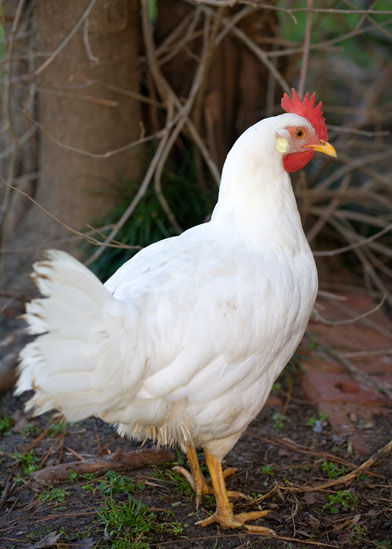 |
 |
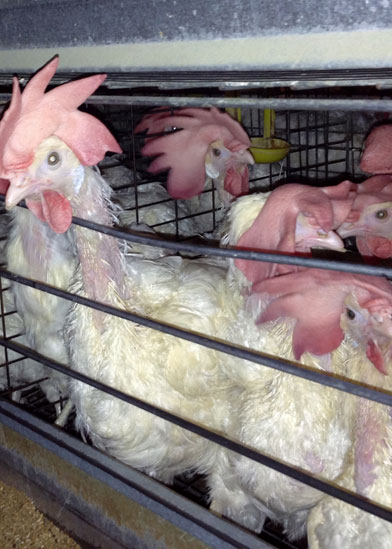 |
|
| Chickens originated from red jungle fowl who naturally live in small groups of just 12. Even after thousands of years of domestication, chickens have the same behaviours and desires as their wild ancestors. They enjoy making nests, preening their feathers, and searching for food. At night, chickens prefer to roost together above the ground for safety and comfort. |
|
On factory farms, chickens are deprived of nearly everything that is natural to them. They are kept in cramped wire battery cages and can never fully spread their wings, walk, perch, or build nests. Each hen has less space than a single sheet of notebook paper to live her entire miserable life. Although chickens can live up to 12 years, those used by the egg industry are killed before reaching their second birthday. |
| |
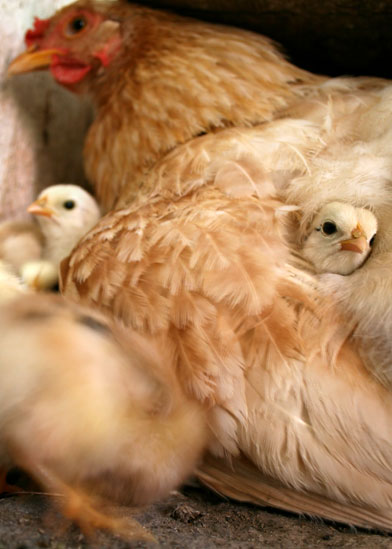 |
 |
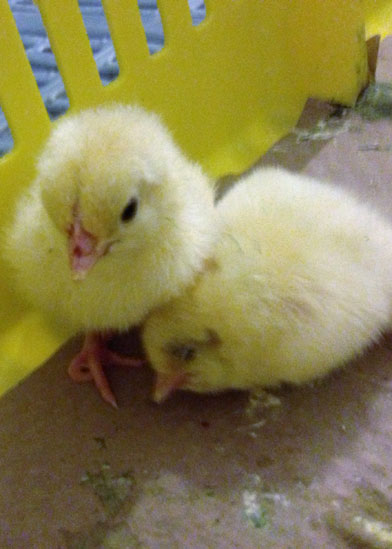 |
|
| Like us, chickens form friendships and have strong family ties. Scientists have recently learned that chickens can recognize one hundred other birds based on distinct facial features. The bond between a hen and her chicks is particularly strong. Hens chirp to their chicks while still in the egg to coordinate hatching, and are fiercely protective of their young. A hen will give her life to protect her chicks. |
|
Chickens on factory farms never get to meet their mothers or experience motherhood themselves. From the time they hatch to the time they are killed, chickens are kept in unnatural groupings in crowded conditions, unable to explore or interact as they naturally would. In the egg industry, males are seen as worthless and killed immediately after hatching, either by being ground up alive or gassed. |
| |
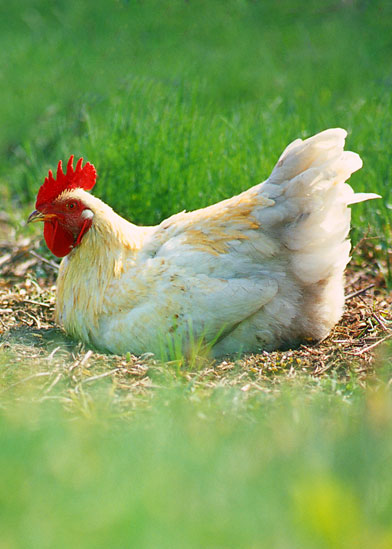 |
 |
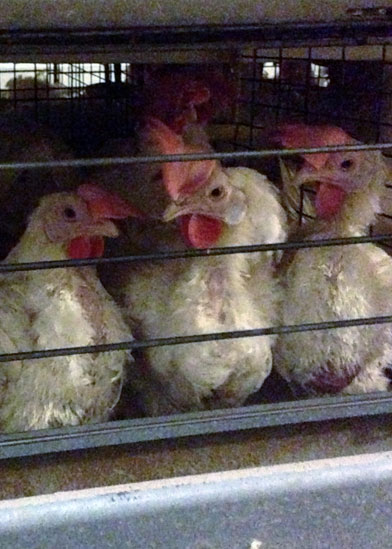 |
|
| Chickens are inquisitive animals, considered by scientists to be as smart as mammals, including some primates. Chickens are able to understand that recently hidden objects still exist, which is beyond the capacity of young children. Dr. Joy Mench observes: "Chickens show sophisticated social behavior. They have more than thirty types of vocalizations." |
|
In factory farms, chickens are treated as mere production machines. In addition to the severe mental and social deprivation, forcing a naturally active bird to spend her life in a cramped and nearly stationary position causes numerous health problems, including lameness, bone brittleness, and muscle weakness. Nearly 30 percent of hens have broken bones at the time they are slaughtered. |
|
 |
|
The best way for individual consumers to help end this cruelty is to leave animals off their plates. |


|
 |

22033 - 131 BLOOR ST. W. | TORONTO, ONTARIO M5S 1R1 | 1-888-875-6170 | [email protected]
|











